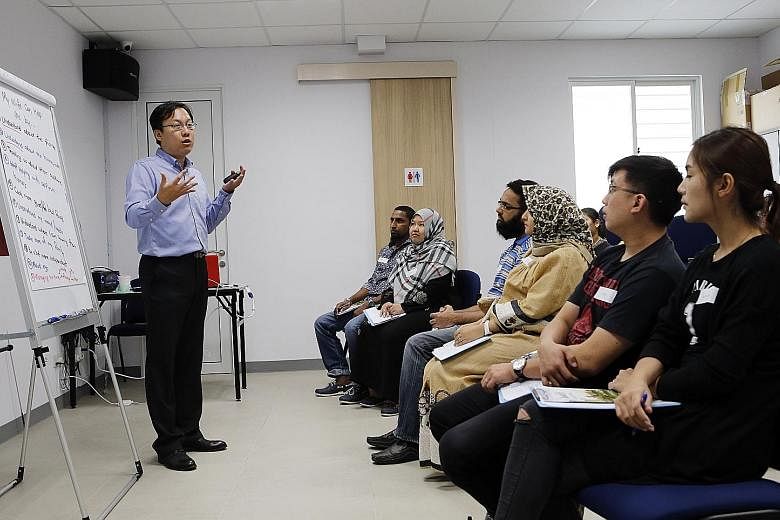It is a Tuesday morning, and eight Singaporeans and their foreign spouses are discussing issues they face in their marriages.
They looked to be in their 30s and 40s, and the foreigners - a mix of both men and women - came from countries such as France, Thailand, and Vietnam.
They asked social worker Justin Paul many anxious questions: Can the Singapore partners be more supportive of their spouses going out to work or attending courses?
Is there anything the couple could do to increase their foreign spouse's chances of getting permanent residency? Would the couple be able to buy a Housing Board flat?
The one-day Marriage Support Programme is part of the Ministry of Social and Family Development's effort to support transnational marriages involving a Singaporean and a non-resident. It is run by voluntary welfare organisations Fei Yue Community Services and Care Corner.
During the session, Mr Paul, 34, discussed effective ways of managing conflicts. He also answered their queries on immigration, employment and housing policies.
He reminded the couples that concepts such as "near" and "far" could have different meanings in different cultural contexts, and that they should not assume that their partners understand what they mean.
Last year, a total of 800 married couples attended the programme, which was launched in December 2014.
Some couples need to attend the course as part of their foreign spouses' applications for long-term visit passes, which give them long-term residency here.
One area that Mr Paul stressed was the need for both the foreign spouses and their Singapore families to try and get along.
If the foreign spouses are unfamiliar with the culture of their partners' families, it could be a source of tension for the couples, Mr Paul told The Sunday Times.
As these couples face restrictions when buying public flats, their Singapore partners' families may feature strongly in their lives as most end up living with them, at least for the first few years, he said.
"For example, the dining table etiquette in a family. It comes naturally to the Singaporean but the foreign spouse may not know it."
Mr Paul and his colleagues are also seeking to engage the Singapore partners' parents, to let them know how they can better support their children's marriages.
While such problems may be present in most marriages, they are magnified for those with a foreign spouse due to cultural, and sometimes communication, differences.
Mr Steven Boey, 56, who works in the construction sector, agreed. He and his China-born wife Shang Xijuan, 42, a part-time waitress, attended the programme shortly after they got married two years ago.
Its focus on cultural differences and conflict management was useful as the couple have differing views on child-rearing, said Mr Boey, who takes care of Madam Shang's 13-year-old son from a previous marriage.
"Our most serious arguments are about child-raising. We have very different views about disciplining children, probably due to cultural differences," he said, as he made reference to China's one-child policy.
"The conflicts can't be solved but at least we can try to manage them."
Other measures to support transnational couples include the pre-marriage long-term visit pass assessment by the Immigration and Checkpoints Authority, introduced last January. The online assessment is done before marriage to determine if the foreign spouses can stay here for the long term.
This helps couples plan for the scenario if their partners are unable to live here over the long term, said Mr Paul. "It also manages the couple's expectations."


